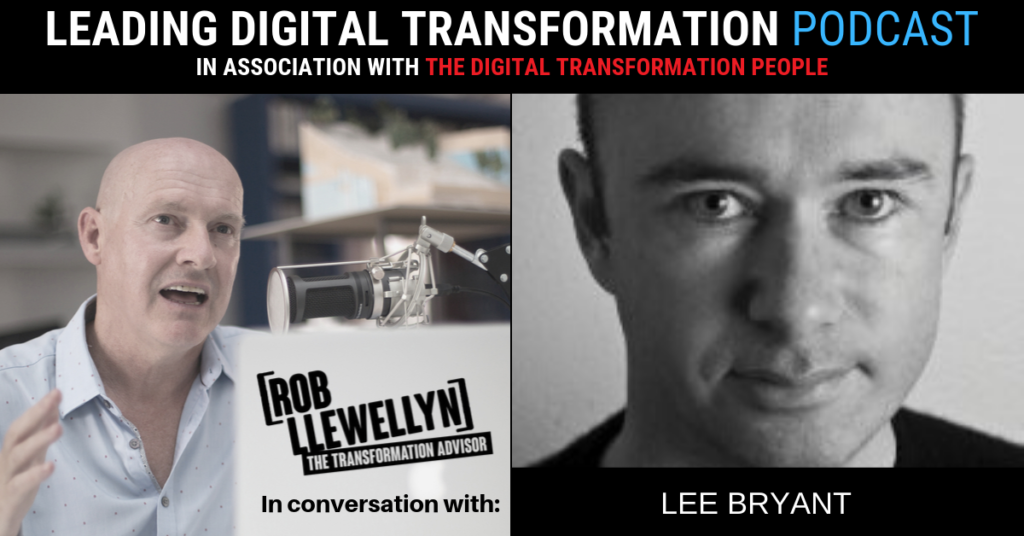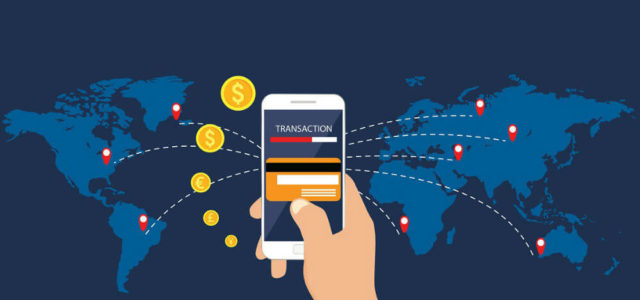‘Leading Digital Transformation’ is a weekly podcast series produced in collaboration between The Digital Transformation People and Rob Llewellyn digital transformation advisor and founder of CXO Transform.
During this series, Rob interviews experienced practitioners, authors and thought leaders whose stories and experiences provide valuable insights for digital transformation success.

In this episode, Rob interviews Lee Bryant, thought leader and co founder of Post*Shift, who discusses why he believes the greatest challenge for today’s leaders is how to upgrade their organisation’s operating system.
Listen here and read the full transcript below.
Rob Llewellyn [00:00:26] Hi, it’s Rob Llewellyn here and welcome back. Today I’m joined by Lee Bryant. Lee is the co-founder of a company called Post*shift, and they work with companies – both large organisations and start-ups – across all key areas of modern digital operations. Lee’s of the belief that the greatest priority for digital leaders these days is to redesign their organisational operating systems to create connected companies. Let’s jump into the interview with Lee to dig deeper on this.
Rob Llewellyn [00:01:02] Lee welcome.
Lee Bryant [00:01:03] Thank you. Nice to talk to you.
Rob Llewellyn [00:01:05] Lee, let’s start off with quite a fundamental question about digital transformation – in your perspective, what’s the real value of digital transformation for companies these days?
Lee Bryant [00:01:17] I think the biggest challenge and one of the most important issues right now is the readiness of organizations themselves to deal with both the opportunities and threats posed by digitization in the broader sense. I think there’s been-, people use the term in very different ways. I think some people use it really just to talk about marketing and social media which I think is a part of the picture, but it’s a very trivial part of the picture. Others might use the term to refer to new digital apps and products and services and so on. But I think the big picture challenge is that most of our organizations, and not just businesses, you know, government and public sector as well, are not structured and not ready to become digital-first organizations. So I think the first challenge really is this digital optimization of getting people ready, so a more connected company, a more data-driven company and something that’s more laterally connected rather than vertically hanging off a hierarchy. So I think that’s challenge number one. I think challenge number two is how we then transform our ways of working using digital technology. And then we come to the icing on the cake if you like, which is our ability to use this new structure and way of working to generate new products, new services, innovation and the customer-facing value from the whole thing. So I think that’s in summary how we see Digital Transformation which is first and foremost about creating organizations that are ready and fit to thrive and survive in the digital era.
Rob Llewellyn [00:02:59] Now, that all sounds really good but I know it’s easier said than done, so how do organizations do this, and overcome the challenges that you’ve just described?
Lee Bryant [00:03:12] It’s tricky. I mean there are some fundamental blockers to digital transformation in organizations today. So to give you a few examples. The annual planning and budget cycle in most organizations – that really acts against agility and adaptability, for example. The role of these internal functions like the HR, IT Procurement, they’ve often been seen as little power centres who some people call The Department of No, you know, they’re not on the hook for positive outcomes. They’re just sort of compliance police and make people work in a certain way or make people follow a certain process. So these are the sort of typical barriers that people face when they try and become more agile in the way they’re working or more adaptive. But there are many more and I think probably the most important is the whole culture of cascading hierarchy-based management and performance reviews and KPIs. You know, this is a very, very old fashioned way of trying to motivate action, co-ordinate work and keep people aligned towards a strategy. And we have far superior methods available to us now in a modern connected organization. So, these are things that tend to hold it back. And so therefore these are things that you really need to work on and provide viable alternatives to if you’re to be able to transition from a late 19th Century early 20th century model of managing the corporation to a 21st Century model of, you know, a live learning organization, a connected organization and something which is fundamentally a lot more agile than today, because I think one mistake that people make sometimes in digital transformation initiatives or projects is that they believe there is a sort of single destination, there’s a target operating model that we can plan our way towards, and once we’re there – tah-dah! change is done, we’ve succeeded and we can just operate that model. In actual fact, there is no destination. You know, what we’re trying to bring to organizations is constant adaptability, constant sensing and responding to external threats, external opportunities or changing customer needs, or changing circumstances in the market. So, building in that constant shift, that constant agility and adaptability, that’s really the goal for me, rather than some model or architecture of the perfect organization. That having been said, we do have some templates and we do have some examples of things that we know work. So I think one of those is the, you know, Amazon championed ‘business as a platform’ model where you connect the organization horizontally – you try and turn processes into services, you pursue automation and then you end up with a service platform of the components, the business cogs, the algorithms, the calculators that help run an organization. And then on top of that platform, you can have a lot more freedom and agility for small teams to work with customers and deliver value using those services. So that’s probably the dominant model. But I think also you can look at examples like Spotify who have a very successful small team model and a few other, you know, case studies which are well documented in the literature as well.
Rob Llewellyn [00:06:33] You mentioned some of the old ways of working and we know of course that these large organizations that become large because they’ve been around for a long time they’ve become very good at doing the same old practices over and over and over. And of course we know it’s really difficult to change behaviours and working practices. So you know, in light of all that Lee, do think large, established firms have a future in the digital world?
Lee Bryant [00:06:58] I do. You know for several reasons. I’m a big fan of-, well I’m a history nerd. So I’m a big fan of old organizations 100, 200 even more years old. And if you look at the history of Europe in particular, the post-World War European progress and development that we’ve seen has been largely a result of various industries developing quite strong high-scale positions, whether it’s automotive and engineering in Germany, whether it’s you know, design businesses and consumer businesses in Italy or Scandinavia, you know these large firms have played a role in social development – not just in terms of their own profit-taking. And so I think we need them. And although software will be everywhere in the digital era, it won’t be everything. You know, we still need power supplies. We still need turbines. We still need vehicles and homes and all this solid matter-based products that start-ups are not really going to replace. So I think for me, you know, it’s a wonderful once in a generation challenge to be able to work with these large companies on their transformation without you know dropping the ball along the way. In other words, you know, it’s one of those cliches that you need to rebuild the plane in flight, but there’s definitely some truth to that and I think that’s where you really learn your trade if you can-, if you can actually bring large organizations with you or seed them with you know change loops and iterative change processes that actually start to scale and go beyond what you can achieve yourself.
Rob Llewellyn [00:08:36] So, we’ve all heard the term ‘software is eating the world’ and of course we’ve seen the likes of Amazon and Facebook and Alibaba and all the others that were small start-ups not so long ago and now taking a dominant, you know, real dominating place on the world stage. Do you think that start-ups will really start taking over in all of these industries, Lee?
Lee Bryant [00:08:59] I think there are many successful scale-ups who will you know grow to compete with some of the existing companies, and we’ve seen that already. Whether they become the same is a good question. I actually don’t think that scale requires the linear, manual, you know, add more headcount, add more departments scaling model that we’ve seen in the traditional corporates as they’ve grown. Instead, I think you can look to the field of what people call exponential organizations. You know, organizations whose growth and scale model is not linear. And so you can still have relatively small headcounts of relatively small teams using automation, using technology, using service platforms to actually achieve scale in the market. So I think we’ll see probably three or four different things. I think one thing we’ll definitely see is individual start-ups making an impact, changing the game and then forcing everyone in the market to respond. So, Tesla’s a great example of that in automotive. Challenger banks like Monzo and N26 and stuff are examples of that in banking. Then I think a second phenomenon we’ll probably see is ecosystem development. So, you know, somebody creates a platform in a market which enables multiple start-ups to take a slice of the pie, if you like. So I think some of the competition from large companies will come from ecosystems and platforms. And then I think we’ll also see I guess what you might call a more traditional model of start-ups becoming scale-ups and achieving scale but differently to the large corporates. I think there’s no question that in areas like automotive and areas like industrial organizations we’re going to see a reduction in the size and headcount of some of these leading organizations. But what we may not see is a significant reduction in their market share or their overall revenues. I just think that they have to develop more automated, less headcount-based approaches to doing what they do today. Otherwise, their cost base simply won’t be competitive with emerging competition from start-up ecosystems, for example.
Rob Llewellyn [00:11:07] Lee, I think that most of our audience today, they’re aware that technology is not the be-all and end-all of transformation. But that said, of course, a lot of this transformation, a lot of the tremendous progress that we’re seeing these days wouldn’t be possible without the innovative use of technology. So just focussing on technology and appreciating it for a moment, what in your view is the most impactful, emerging technology right now?
Lee Bryant [00:11:35] It’s a good question. You know a lot of people are going to say blockchain, bitcoin and I would fundamentally disagree with that. I think that’s not going to change the world anytime soon. And I think it’s massively overhyped in terms of its applicability and actual practical use cases. I think the real answer to this is not one individual technology but it’s how we see the interplay and co-evolution of technologies. And what I mean by that is that there are some quite simple technologies around automation which will take us on a path towards machine learning and eventually to real artificial intelligence not marketing A.I. which is where we are with most of these sectors today. And I think that will combine with other things like you know simple VR /AR technologies. You know, it will combine with platforms to create a more evolutionary environment around technology. I think all technologies will develop more quickly in that co-evolution configuration. But I think for organizations today, it’s really about smart automation and this-, what I would label as ‘augmented human intelligence’ area of technology. In other words, using smart agents, using automation, using some background machine learning and analytics to just give a leg up to people who are doing the work and making decisions and adding value to customers. I think that set of technology together is definitely the most impactful over the next five years for most organizations that listeners will be working in today.
Rob Llewellyn [00:13:11] Now you just mentioned smart automation, smart agents, you know a couple of months ago I was in Oman in the Middle East and I was speaking at a digital transformation conference for the HR fraternity. And there was a big concern there about automation destroying jobs. So what’s your view on that Lee? Is it a good thing, is it a bad thing?
Lee Bryant [00:13:32] It’s obviously neither and both in the sense that we’ve seen multiple waves of innovation threatening basic jobs. So one of them was the industrialization of agriculture that took millions of jobs out of the workforce initially. But now we never really consider that, we don’t look back and say that was a disaster. In fact, what it did was it helped urbanization, it helped human development and progress – people moved to the cities and then the industrial revolution came along and created a whole new set of jobs for people who might previously have worked in agriculture. Similarly when the spreadsheet first entered the market lots of people feared for the many thousands of human computers and people doing bookkeeping and so on and so forth. But, as we saw there, again it just led to more innovation and more jobs and so on. So, my view in organizations is that we need to be honest and say yes, there’s probably going to be an overall headcount reduction in organizations as they are set up today. But the way that that will be achieved is first of all by automating the really boring stuff that probably nobody particularly enjoys doing so that we free up people to use their human intuition, creativity, and skills to do more with the outputs of that automated process. So I think we’ll see first of all a shift in jobs in organizations away from just repetitive process completion, to actually sitting on top of automated processes and using them in a smarter way or perhaps having more customer-facing people or more personal service people etc.. And then we will see a general trend towards not requiring the same number of people to create the same value or to achieve the same outcomes in organizations. And so yes, that might result in a net reduction in some of the basic jobs. But I think we will see an explosion in all kinds of new jobs. You know we’re always going to want personal service. We’re always going to want quality and we’re always going to want professionals and advisors and people to help us. So I think the scope for increase in those areas is quite exciting actually.
Rob Llewellyn [00:15:42] Lee, we’re going to have to wrap it up there, but listen, where can people go to learn more about the kind of thing that you’ve been talking to us about today?
Lee Bryant [00:15:51] So I talk about some of these things on Twitter – I am @leebryant on Twitter and Post*Shift.com is our corporate home. We have our blog there, we share some of our research and bits and pieces, so that’s probably the best place to come across these ideas and these concepts.
Rob Llewellyn [00:16:11] It’s been terrific talking with you. Thank you so much for sharing your insights with us today.
Lee Bryant [00:16:16] Thank you. A real pleasure.
Announcer: [00:16:30] We hope you enjoyed this episode of “Leading Digital Transformation” with Rob Llewellyn and The Digital Transformation People. Visit www.thedigitaltransformationpeople.com to secure the knowledge, talent and services you need for digital transformation success. To continue your journey as a certified transformation professional, visit www.RobLlewellyn.com. Be sure to subscribe to the podcast and follow us on Twitter @TheDigitalTP and @RobertLlewellyn
Article by channel:
Everything you need to know about Digital Transformation
The best articles, news and events direct to your inbox
Read more articles tagged: Featured






